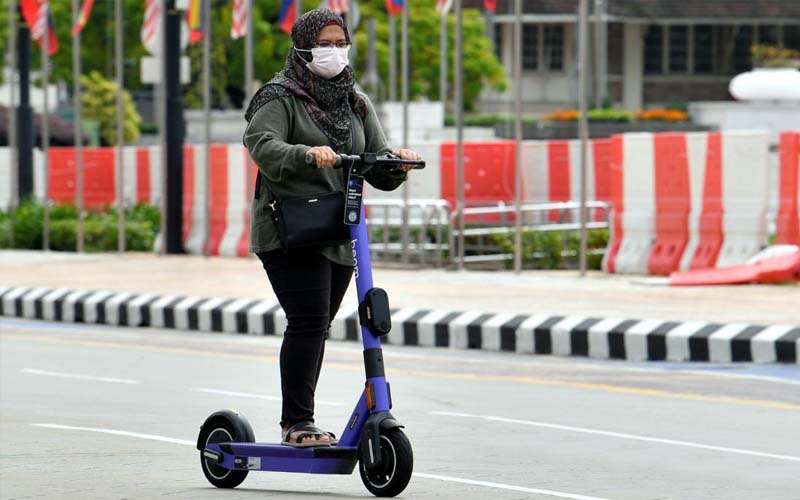
From Lee Chean Chung and Jeremy Ang
Driving around Petaling Jaya or Kuala Lumpur over the weekends on errands or getting groceries, some of us definitely have noticed more electric vehicles (EVs) like Tesla and BYD on the roads.
It is a new scene in town as the government pushes for EV adoption.
However, while more EVs are hitting the street, electric motorbikes are almost absent on the road.
Despite motorcycles constituting about 47% of all vehicles on the road, the adoption of electric motorbikes remains notably low.
This puzzling phenomenon contrasts with the fact that everyone is talking about the National Energy Transition Roadmap (NETR), which aims to reduce their carbon footprint. The reality appears quite the opposite, especially for motorcyclists.
According to a BCG-WWF Malaysia report, the shift from internal combustion engine (ICE) motorcycles to electric motorbikes is anticipated to occur before the widespread adoption of electric cars.
Electric motorbikes present a more cost-effective alternative to electric cars, with prices ranging from RM7,000 to RM10,000. These lower prices empower Malaysians to actively participate in decarbonising their mobility.
At a press conference on Sept 5, we called upon the government to set a target for the transition to fully electric motorbikes. We emphasised that electric motorbikes should comprise 40% of total industry volume (TIV) by 2030 and 100% by 2040.
However, current transportation trends in Malaysia appear to deviate from this projection due to the faster adoption rate of EVs compared to electric motorbikes.
The disparity between EVs and electric motorbikes can be traced back to government policies, with the decision to relax import rules for completely built-up EVs priced above RM 100,000, combined with incentives such as road tax waivers until 2025 and income tax rebates.
With that, the carbon emission reduction transportation policies have been pro luxury EV models while neglecting entry-level, consumer-affordable EV models, not to mention electric bikes, which have seemingly become the forgotten children of the government’s energy transition vision, causing Malaysia to lag significantly behind neighbouring countries in transitioning to electric motorcycles.
In fact, electrification is the most viable way to decarbonise Malaysia’s transportation. The energy transition of motorbikes from carbon-intensive, fossil fuel-powered, dangerous (high power, high speed) systems to low carbon, electric-powered, safer (low power, low speed) systems is undoubtedly in line with the “green mobility” efforts.
To overcome this policy shortcoming, the government should facilitate local electric bike manufacturers to import their products by customising the BEV Global Leaders Programme to incorporate electric bikes, similar to how Tesla obtains their franchise Approved Permits (AP) and making electric bikes a more viable option for Malaysians.
Also, the protracted Vehicle Type Approval (VTA) processes lasting six to eight months, and unclear guidelines for deploying charging infrastructure are another significant barrier to adopting electric motorbikes in Malaysia.
Apart from the major bottlenecks stated above, a whole-of-government approach is needed to accelerate the adoption of electric motorbikes in Malaysia, including:
- The finance ministry should leverage public procurement that prioritises electric motorbikes;
- The local government development ministry and local authorities should facilitate the deployment of electric motorcycle charging infrastructure;
- The transport ministry should streamline the VTA process and provide better transparency regarding all documentation. Current curriculum at all driving learning centres should incorporate electric motorbike riding modules; and
- The entrepreneurial and cooperatives development ministry and Tekun should assist food and parcel delivery riders transition to electric motorcycles.
In fact, the transport ministry should consider allowing motorbike-hailing services for electric motorcycles. In Indonesia, Gojek, a motorbike-hailing firm, has gained popularity as traffic congestion worsens.
Transport minister Loke Siew Fook mentioned during a parliamentary session: “Motorbike hailing will be an essential component in providing a comprehensive public transport system, offering first- and last-mile connectivity.”
This can be done and should be done.
Our neighbours Thailand and Vietnam have embraced electric motorbikes in their daily transportation landscape years ago. In Thailand, TÜV SÜD Thailand, a state-of-the-art battery test centre, has been established near Bangkok.
Many of our local players are forced to send their batteries to Thailand for testing because our own testing centre, Sirim, lacks the necessary facilities for this purpose.
Malaysia should not miss the opportunity to become a pioneer in the regional and international EV hub, particularly in the electric motorbike sector. This transition will pave the way to the future, in which we hope to achieve net-zero carbon emissions by 2050. - FMT
Lee Chean Chung is the Petaling Jaya MP.
Jeremy Ang is a research officer for the Miri MP.
The views expressed are those of the writers and do not necessarily reflect those of MMKtT.



No comments:
Post a Comment
Note: Only a member of this blog may post a comment.